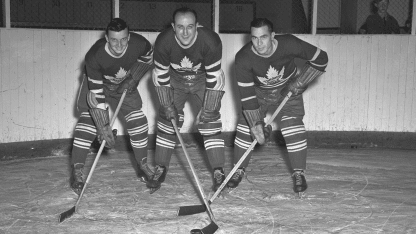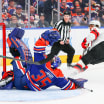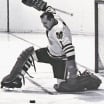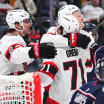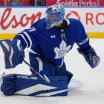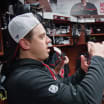Legendary hockey reporter Stan Fischler writes a weekly scrapbook for NHL.com. Fischler, also known as "The Hockey Maven," shares his humor and insight with readers every Wednesday.
The Florida Panthers are back-to-back Stanley Cup champions after a six-game victory against the Edmonton Oilers in a Stanley Cup Final considered an all-time classic. It harbored memories of a unique seven-game Final between the Detroit Red Wings and Toronto Maple Leafs 80 years ago.
The Panthers repeated as Stanley Cup champions with a 5-1 win against the Oilers in Game 6 of the Stanley Cup Final at Amerant Bank Arena in Sunrise, Florida, on Tuesday, overpowering Edmonton and the Gold Dust Twins of Connor McDavid and Leon Draisaitl to produce one of the most memorable championship rounds in NHL history. Three of the six games needed overtime, Florida's 5-4 victory in Game 2 going to double OT.
Among many heroes were Panthers goalie Sergei Bobrovsky (2.45 goals-against average and .919 save percentage in the series) and forwards Matthew Tkachuk and Sam Bennett. Tkachuk's goal at 19:13 of the first period was the game-winner. Bennett won the Conn Smythe Trophy voted as MVP of the Stanley Cup Playoffs with a postseason-high 15 goals.
"We're a dynasty now," Tkachuk said. "Three years in a row in the Final and two championships. This is a special group."
Brad Marchand, a 37-year-old forward, scored six goals against Edmonton, most ever by a player 35 years old or older in a Stanley Cup Final and by anyone since Oilers forward Esa Tikkanen scored six in 1988. He'll get his name on the Cup for the first time since 2011 with the Boston Bruins.
"I can't put this into reality," he grinned, "how great it feels."
Can it be compared to classic playoff series from yesteryear? For sure, and this happens to be the 80th anniversary of one of my favorites: the 1945 Stanley Cup Final that overflowed with storylines and rare heroes such as Maple Leafs goalie Frank "Ulcers" McCool.
Back then, there were no starry McDavid-Marchand headliners. World War II raged in Europe and the Pacific and most pre-war NHL aces were wearing khakis.
Yet the Maple Leafs and Detroit Red Wings engaged in an unforgettable seven-game series.
"The 1945 Cup Final was breathtaking," said Jim Hendy, editor of the National 1946 Official Hockey Guide, the precursor of the NHL Official Guide and Record Book. "It had all kinds of surprises including a one-of-a-kind goalie, a dramatic third period Game 7 climax and fresh personalities."
One of them, Detroit's rookie goalie Harry Lumley, would enjoy a 16-season NHL career and earn election to the Hockey Hall of Fame with the Class of 1980. McCool opened the final with three straight shutouts and then quit the Maple Leafs in his second season to become a sports editor and later general manager and assistant publisher for the Calgary Albertan.
"McCool was both brilliant and living on the edge. He played every minute of the 1944-45 year, led the NHL with four shutouts, earned the Calder Trophy and in the playoffs he recorded another four shutouts," wrote historian Andrew Podnieks in his book, "Players."
McCool also suffered from painful ulcers.
"The Cup final seemed like an eternity," he said. "I couldn't keep anything down, not even the ulcer pills, but I was so much on edge even slow starvation didn't keep me from going through the motions."
Said Podnieks: "In the final round against Detroit, McCool's stomach got so bad he had to take frequent breaks to drink milk."
Sweeney Schriner was another unlikely hero. The future Hall of Fame left wing left Toronto in 1943 but returned a year later at age 33 -- far from over the hill.
Jim Hurley, who covered the Final for the New York Daily Mirror, marveled at Schriner's agility in Game 1 on April 6, 1945.
"Late in the first period, Sweeney burst out of the midst of a Red Wing rush, out-sped pursuers on a 140-foot dash before he feinted Lumley and rapped the puck into the far corner," he wrote. "Toronto won the game 1-0 and the Leafs were off and running."
His ulcers treated with frequent milk dosages, McCool and the Maple Leafs won 2-0 in Game 2 and 1-0 in Game 3. The Red Wings won the next three 5-3, 2-0 and 1-0 in overtime, setting up a classic Game 7 at Olympia Stadium in Detroit on April 22, 1945.
The game was tied 1-1 with less than eight minutes left in the third. Curiously, Maple Leafs defenseman Babe Pratt, the hero-to-be, had been ordered to room with coach Hap Day for every road game.
"It was unique," Podnieks said. "The Leafs didn't want to take any chances that Babe would break curfew, so they had him remain with Day. The strategy worked and paid off with a championship."
After Detroit forward Syd Howe, another future Hall of Famer, was penalized at 11:55 of the third, Pratt quarterbacked the power play.
"As the Leafs stormed the Detroit cage," Hurley wrote, "Pratt pounced on a rebound and whipped it home at 12:14. The game ended with the Maple Leafs winning their third Stanley Cup."
Maple Leafs owner Conn Smythe, who nearly died of wounds sustained in the 1944 Battle for Caen in Normandy, returned home in time to enjoy the triumph.
"I don't think folks appreciate how much team spirit contributed to this championship," lauded Smythe. "We've never had a team with more of it."
The best punchline of all was supplied by NHL Commissioner Gary Bettman when he presented the Stanley Cup to Panthers captain Aleksander Barkov: "It feels like we just did this!"
Bennett had the best ad lib: "It's the best feeling in the world."
